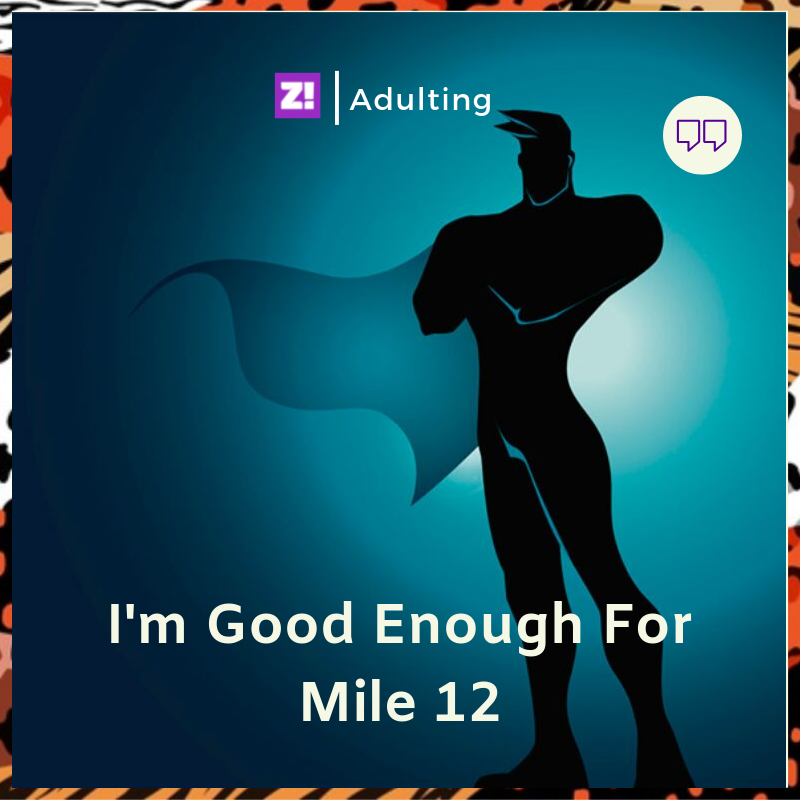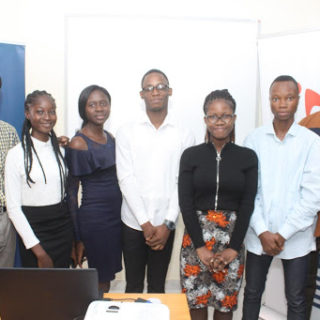We want to know how young people become adults. The question we ask is “What’s your coming of age story?” Every Thursday, we’ll bring you the story one young Nigerian’s journey to adulthood and how it shaped them.
I grew up in Mile 12. It’s most known for the sprawling food market – the place where other markets come to shop. I remember it for noise, drama, fights and crowded apartments. There was no better example of Mile 12’s rowdy mix than our compound – it had no gates, two beer parlours, a barbershop, a church and 40+ occupants.

There, my parents managed the enviable task of raising me and later, my two younger siblings, on their terms. We were the only children there who had a private school education. While they couldn’t give us life beyond that environment, they showed it to us, first in newspapers and later, bootlegged cable television.
I can’t tell if it was this exposure or an unwarranted ‘child prodigy’ tag that set us apart, but we were always treated like an exotic species. Even at school, when I was 8 and my school got into fights with the neighbouring primary school, my friends would ask me to look out rather than get involved. Once, I forced myself into the situation and got my uniform ripped. A friend begged until I agreed to swap shirts. We knew the implications, but he would rather catch a beating than let me stain my white.
Adults were barely different. I remember our landlord, a man in his early 40s, coming to our door to ask me what ‘moving stairs’ are called. “Escalators”, I said. I had no idea how I knew the answer. At that point, I was already tired of being treated differently. I wanted to fight on the street like my friends. When half of my friends didn’t make the jump to secondary school, I wanted to be like them too.

It wasn’t meant to be. I learned to punch above my weight from my father who moved to Lagos from Ibadan in the 1980s, with a letter of referral to the Nigerian Defence Academy and some change. He didn’t get to the army as he’d hoped, so he turned his attention to other, more pressing matters like surviving, and later, raising kids and giving them the life he never had.
Adulthood to me was what my father did – waking up before your kids and returning after they’ve gone to bed, providing for multiple extended family members, with little to show for your work.
A younger me would never admit how I admired him. I’m like an updated version of the man, one who never combs his hair and is more given to excesses than he was.
The other people I looked up to were too distant from my reality to offer any true lessons, like Anakin Skywalker, Frodo or Nas. Those who were close were too defective to be worthy of emulation, like Uncle Solomon, my childhood best friend who got addicted to cocaine and ripped a bass drum open with his head.
In 2008, I left home to study Law at a university in Ekiti. It had come as fast as everyone expected. Tertiary education is considered a luxury where I come from so it felt like the entire neighbourhood was sending me off. I like to say I never returned home after that.
Ado-Ekiti was a different world from the one I grew up in. I was a 15-year-old with pressure to deliver on years of promise, but I found myself in a place with no electricity, lethargic lecturers and all-powerful students.

Maybe it was the freedom or a need to treated like just every other person. But a few gang fights, some police trouble and many spontaneous inter-state trips later, four years had passed.
My first semester in university had been a parent’s dream. I’d skipped most of my lectures and managed to score in the top 5% of the class. When I graduated at 21, I was in the bottom 30%.
Somewhere in those six years, I lost every inkling of who I was. People have blamed my parents for sending me off so young; others say it was being forced to study a course I had no love for. I only blamed myself. I’d let too many people down. I had to regain their trust and belief. That was what my year in law school and the few months I spent in practice were about; showing I was worth it.
In 2016, the year I was supposed to go for NYSC, I moved to Benin for what was supposed to be a year of personal discovery. There, at the end of several cannabis joints and old Majek Fashek songs, I found something. Even when I feign disinterest as I often do, I’ve always felt like I had a point to prove.
People often say I have a saviour complex. And it’s true. It shows up in my obsession with emerging artists, and how I like to commit to more work than I can reasonably handle. But I wouldn’t have it any other way. Somewhere beneath the reckless exterior, a part of me believes I have a duty to everyone who looked out for me, from the guy who gave me his uniform to the Head of Department who let me graduate on the promise that I’d make something of my self.
It’s why years after my family moved, I got an apartment with my girlfriend a few minutes from the place I grew up in. No-one from Mile 12 knows that I live here. They don’t need to. I’ll go when I have something to offer them.

I’ve spent the last four years cutting my teeth as a storyteller. I have an intense passion for music and diverse perspectives. It’s come with its own wins, but my biggest accomplishment is providing for my family. Overachieving for so long has caught up with my father, and while he insists he’s capable, I’ve taken on his role as provider, albeit from afar. I’m not the child of their dreams, the one neighbours would come to ask questions, anymore. Now, people are warier than anything when they look at me. But I like being misunderstood; it’s more exciting than being pampered.
As proud as I am of hewing my path, life often reminds me of my backstory. A few years ago, I missed out an important job because “I’d never been outside the country and thus lacked the requisite exposure to tell stories on a wider scale”.
Adulting to me is making sure no one will offer such an excuse to any of my kids. It’s making sure that my baby sister can attend her convocation, even if it means I have to take a loan for it. Adulting is making sure that I deliver on every promise that I made by being the kid who never fit in, even if it means disappointing the people around me by constantly lifting more than I can carry.
It’s why I decided early that there can be no room for regrets. My journey could only have brought me here. Sometimes it feels too far from my destination but the excitement of not knowing if I’ll ever be fully capable of what’s expected of me is enough.
There’s too much to prove; too little to time to slow down and take stock.




